Organisational Behaviour Report: Sainsbury Culture and Power
VerifiedAdded on 2023/01/19
|20
|5690
|26
Report
AI Summary
This report provides an in-depth analysis of organizational behaviour within Sainsbury, a major UK supermarket chain. It explores the influence of organizational culture, politics, and power dynamics on individual and team behaviour and performance. The report examines different models of organizational culture, including Handy's model, and analyzes the impact of various power types such as coercive, reward, legitimate, and referent power. It also considers Hofstede's cultural dimensions model to understand how cultural factors affect the organization. The analysis focuses on how organizational culture, power, and politics impact career development and the achievement of business objectives, with a particular emphasis on the effectiveness of role culture and reward power within Sainsbury. The report concludes by highlighting the significance of these factors in enhancing productivity, profitability, and overall organizational success.
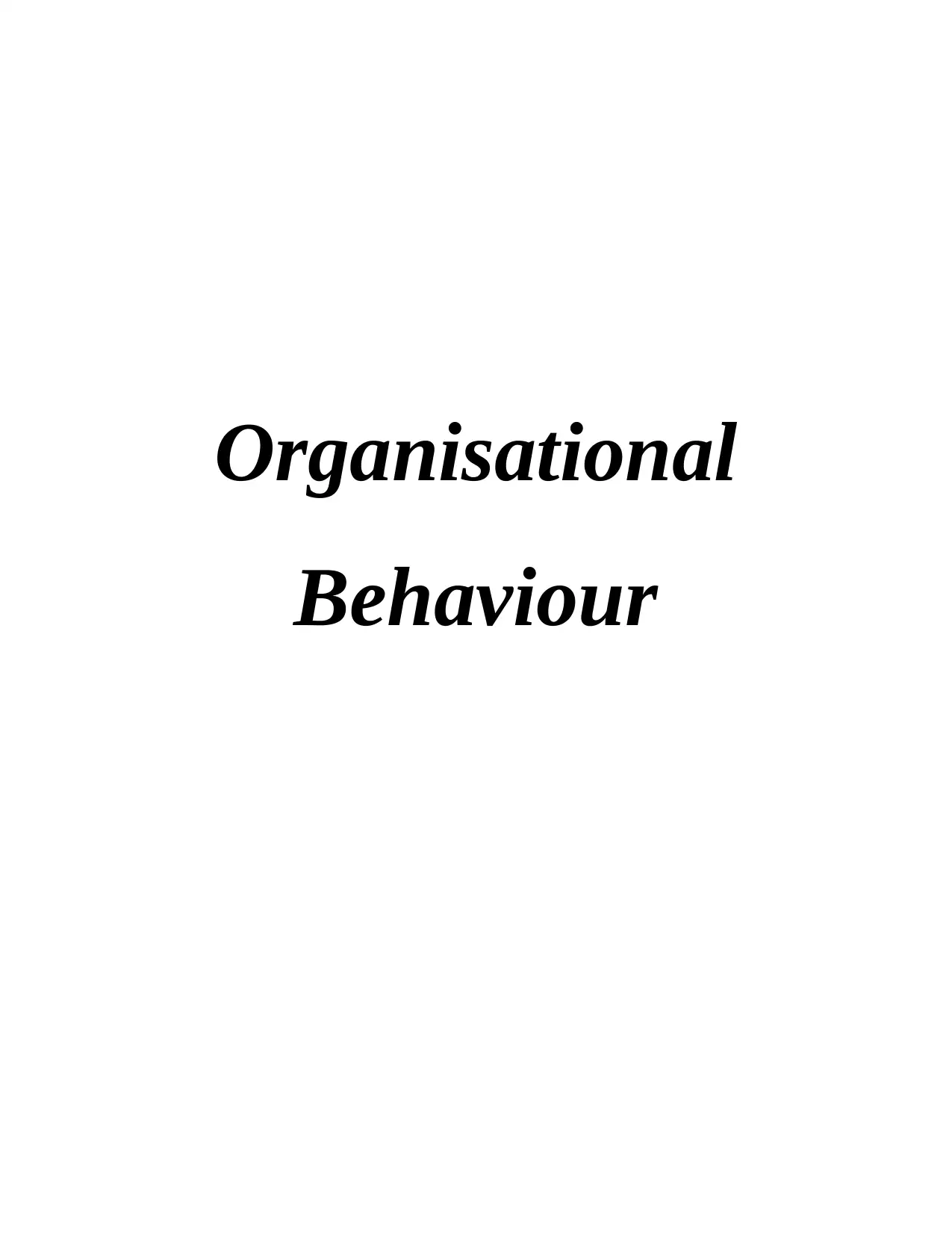
Organisational
Behaviour
Behaviour
Paraphrase This Document
Need a fresh take? Get an instant paraphrase of this document with our AI Paraphraser
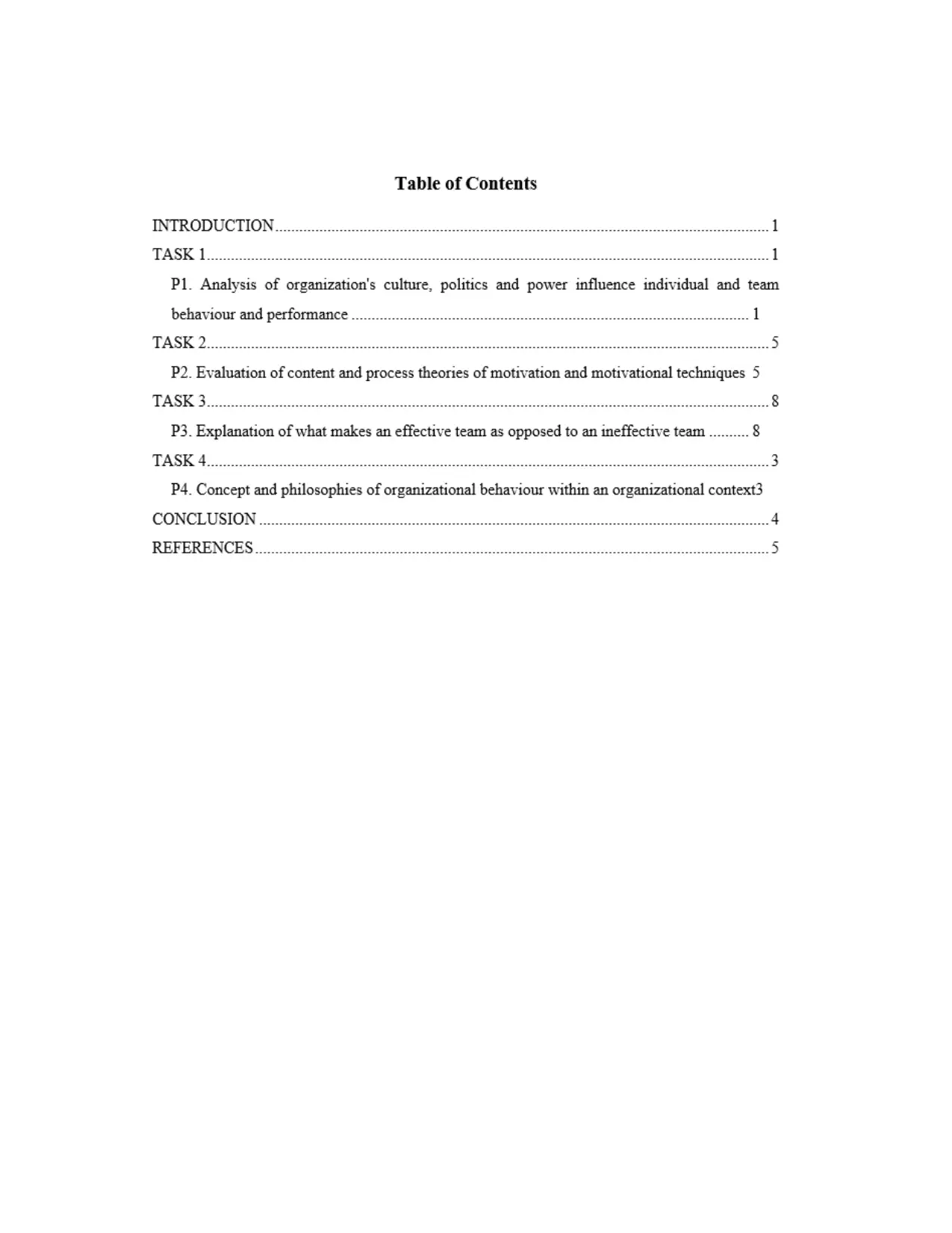
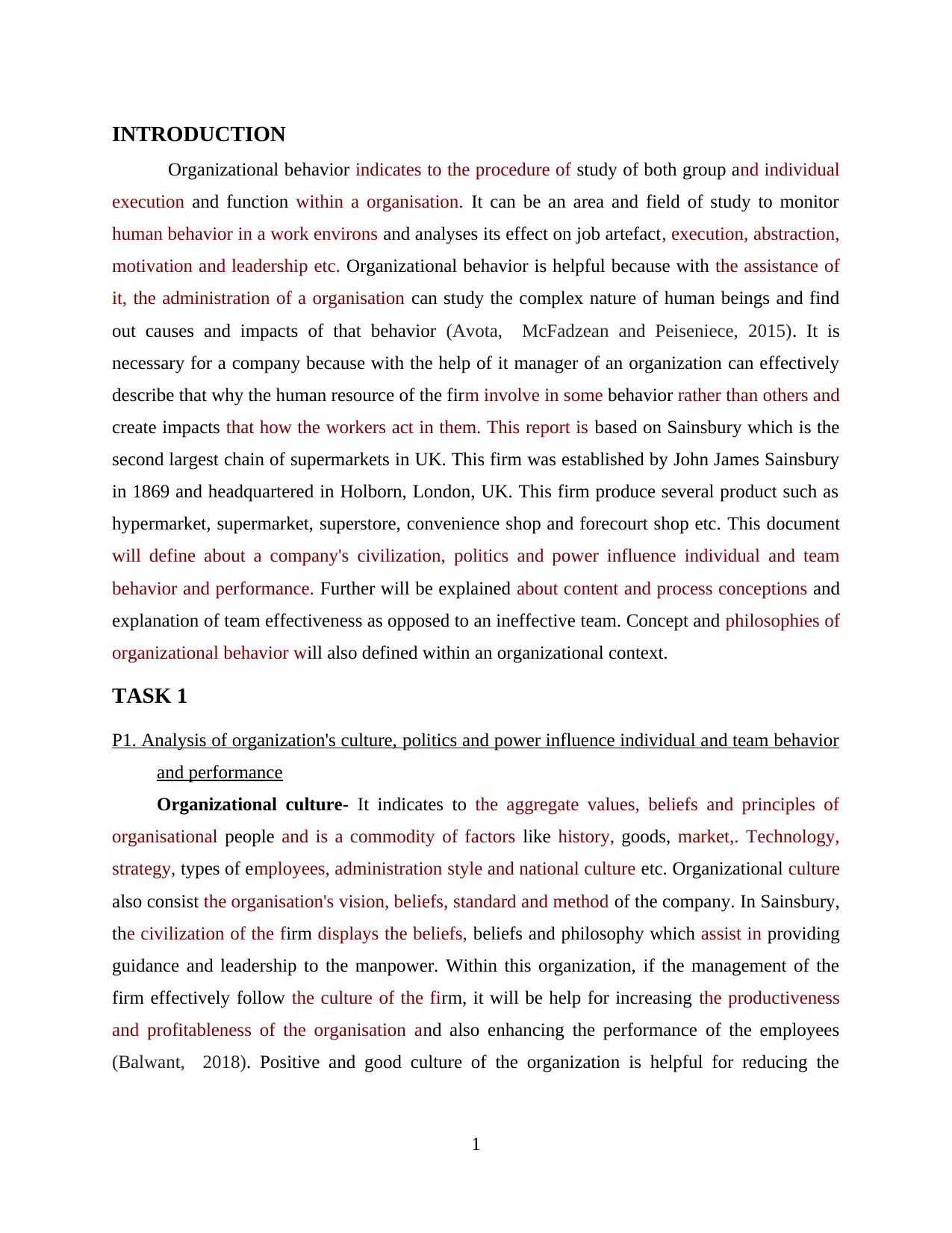
INTRODUCTION
Organizational behavior indicates to the procedure of study of both group and individual
execution and function within a organisation. It can be an area and field of study to monitor
human behavior in a work environs and analyses its effect on job artefact, execution, abstraction,
motivation and leadership etc. Organizational behavior is helpful because with the assistance of
it, the administration of a organisation can study the complex nature of human beings and find
out causes and impacts of that behavior (Avota, McFadzean and Peiseniece, 2015). It is
necessary for a company because with the help of it manager of an organization can effectively
describe that why the human resource of the firm involve in some behavior rather than others and
create impacts that how the workers act in them. This report is based on Sainsbury which is the
second largest chain of supermarkets in UK. This firm was established by John James Sainsbury
in 1869 and headquartered in Holborn, London, UK. This firm produce several product such as
hypermarket, supermarket, superstore, convenience shop and forecourt shop etc. This document
will define about a company's civilization, politics and power influence individual and team
behavior and performance. Further will be explained about content and process conceptions and
explanation of team effectiveness as opposed to an ineffective team. Concept and philosophies of
organizational behavior will also defined within an organizational context.
TASK 1
P1. Analysis of organization's culture, politics and power influence individual and team behavior
and performance
Organizational culture- It indicates to the aggregate values, beliefs and principles of
organisational people and is a commodity of factors like history, goods, market,. Technology,
strategy, types of employees, administration style and national culture etc. Organizational culture
also consist the organisation's vision, beliefs, standard and method of the company. In Sainsbury,
the civilization of the firm displays the beliefs, beliefs and philosophy which assist in providing
guidance and leadership to the manpower. Within this organization, if the management of the
firm effectively follow the culture of the firm, it will be help for increasing the productiveness
and profitableness of the organisation and also enhancing the performance of the employees
(Balwant, 2018). Positive and good culture of the organization is helpful for reducing the
1
Organizational behavior indicates to the procedure of study of both group and individual
execution and function within a organisation. It can be an area and field of study to monitor
human behavior in a work environs and analyses its effect on job artefact, execution, abstraction,
motivation and leadership etc. Organizational behavior is helpful because with the assistance of
it, the administration of a organisation can study the complex nature of human beings and find
out causes and impacts of that behavior (Avota, McFadzean and Peiseniece, 2015). It is
necessary for a company because with the help of it manager of an organization can effectively
describe that why the human resource of the firm involve in some behavior rather than others and
create impacts that how the workers act in them. This report is based on Sainsbury which is the
second largest chain of supermarkets in UK. This firm was established by John James Sainsbury
in 1869 and headquartered in Holborn, London, UK. This firm produce several product such as
hypermarket, supermarket, superstore, convenience shop and forecourt shop etc. This document
will define about a company's civilization, politics and power influence individual and team
behavior and performance. Further will be explained about content and process conceptions and
explanation of team effectiveness as opposed to an ineffective team. Concept and philosophies of
organizational behavior will also defined within an organizational context.
TASK 1
P1. Analysis of organization's culture, politics and power influence individual and team behavior
and performance
Organizational culture- It indicates to the aggregate values, beliefs and principles of
organisational people and is a commodity of factors like history, goods, market,. Technology,
strategy, types of employees, administration style and national culture etc. Organizational culture
also consist the organisation's vision, beliefs, standard and method of the company. In Sainsbury,
the civilization of the firm displays the beliefs, beliefs and philosophy which assist in providing
guidance and leadership to the manpower. Within this organization, if the management of the
firm effectively follow the culture of the firm, it will be help for increasing the productiveness
and profitableness of the organisation and also enhancing the performance of the employees
(Balwant, 2018). Positive and good culture of the organization is helpful for reducing the
1
⊘ This is a preview!⊘
Do you want full access?
Subscribe today to unlock all pages.

Trusted by 1+ million students worldwide
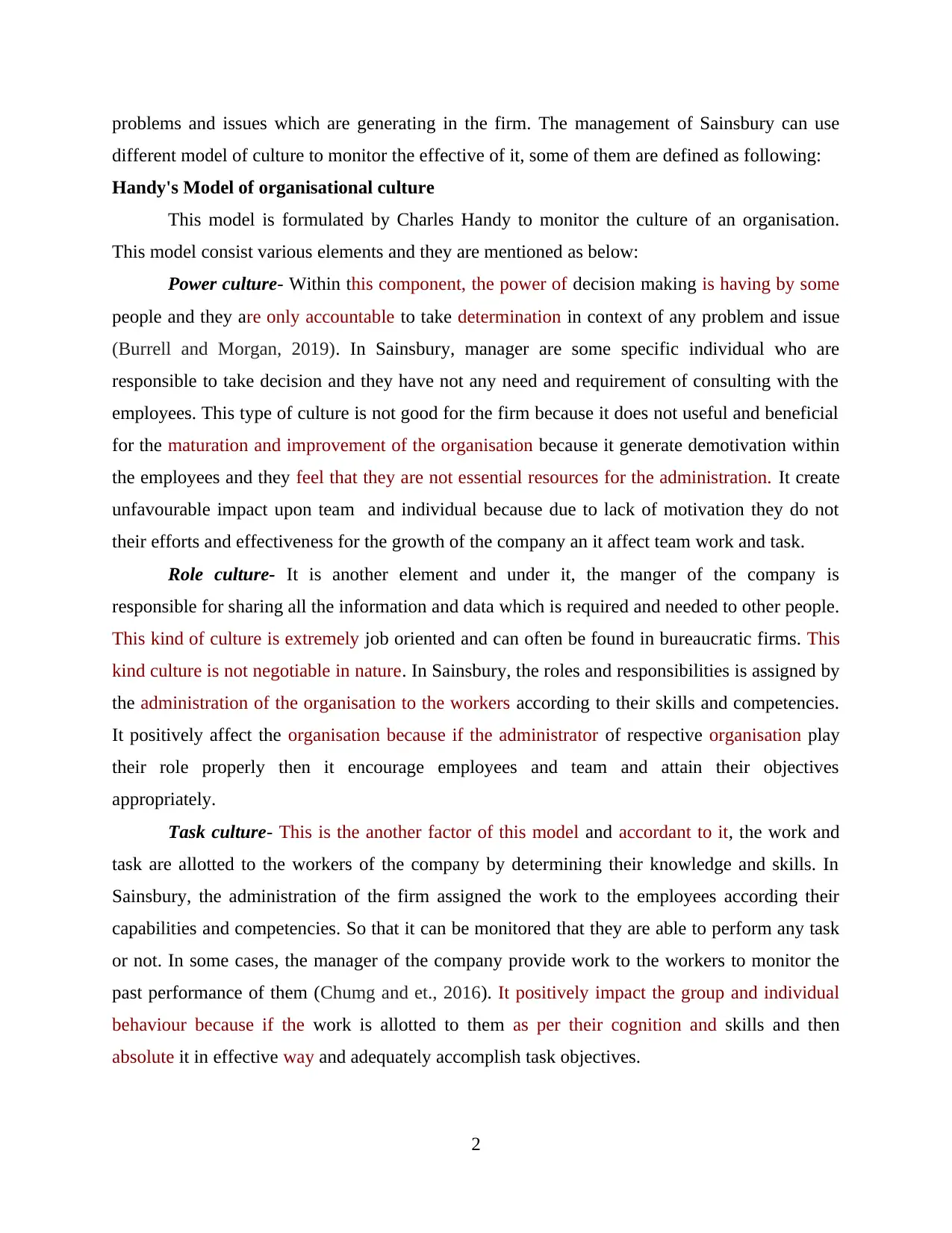
problems and issues which are generating in the firm. The management of Sainsbury can use
different model of culture to monitor the effective of it, some of them are defined as following:
Handy's Model of organisational culture
This model is formulated by Charles Handy to monitor the culture of an organisation.
This model consist various elements and they are mentioned as below:
Power culture- Within this component, the power of decision making is having by some
people and they are only accountable to take determination in context of any problem and issue
(Burrell and Morgan, 2019). In Sainsbury, manager are some specific individual who are
responsible to take decision and they have not any need and requirement of consulting with the
employees. This type of culture is not good for the firm because it does not useful and beneficial
for the maturation and improvement of the organisation because it generate demotivation within
the employees and they feel that they are not essential resources for the administration. It create
unfavourable impact upon team and individual because due to lack of motivation they do not
their efforts and effectiveness for the growth of the company an it affect team work and task.
Role culture- It is another element and under it, the manger of the company is
responsible for sharing all the information and data which is required and needed to other people.
This kind of culture is extremely job oriented and can often be found in bureaucratic firms. This
kind culture is not negotiable in nature. In Sainsbury, the roles and responsibilities is assigned by
the administration of the organisation to the workers according to their skills and competencies.
It positively affect the organisation because if the administrator of respective organisation play
their role properly then it encourage employees and team and attain their objectives
appropriately.
Task culture- This is the another factor of this model and accordant to it, the work and
task are allotted to the workers of the company by determining their knowledge and skills. In
Sainsbury, the administration of the firm assigned the work to the employees according their
capabilities and competencies. So that it can be monitored that they are able to perform any task
or not. In some cases, the manager of the company provide work to the workers to monitor the
past performance of them (Chumg and et., 2016). It positively impact the group and individual
behaviour because if the work is allotted to them as per their cognition and skills and then
absolute it in effective way and adequately accomplish task objectives.
2
different model of culture to monitor the effective of it, some of them are defined as following:
Handy's Model of organisational culture
This model is formulated by Charles Handy to monitor the culture of an organisation.
This model consist various elements and they are mentioned as below:
Power culture- Within this component, the power of decision making is having by some
people and they are only accountable to take determination in context of any problem and issue
(Burrell and Morgan, 2019). In Sainsbury, manager are some specific individual who are
responsible to take decision and they have not any need and requirement of consulting with the
employees. This type of culture is not good for the firm because it does not useful and beneficial
for the maturation and improvement of the organisation because it generate demotivation within
the employees and they feel that they are not essential resources for the administration. It create
unfavourable impact upon team and individual because due to lack of motivation they do not
their efforts and effectiveness for the growth of the company an it affect team work and task.
Role culture- It is another element and under it, the manger of the company is
responsible for sharing all the information and data which is required and needed to other people.
This kind of culture is extremely job oriented and can often be found in bureaucratic firms. This
kind culture is not negotiable in nature. In Sainsbury, the roles and responsibilities is assigned by
the administration of the organisation to the workers according to their skills and competencies.
It positively affect the organisation because if the administrator of respective organisation play
their role properly then it encourage employees and team and attain their objectives
appropriately.
Task culture- This is the another factor of this model and accordant to it, the work and
task are allotted to the workers of the company by determining their knowledge and skills. In
Sainsbury, the administration of the firm assigned the work to the employees according their
capabilities and competencies. So that it can be monitored that they are able to perform any task
or not. In some cases, the manager of the company provide work to the workers to monitor the
past performance of them (Chumg and et., 2016). It positively impact the group and individual
behaviour because if the work is allotted to them as per their cognition and skills and then
absolute it in effective way and adequately accomplish task objectives.
2
Paraphrase This Document
Need a fresh take? Get an instant paraphrase of this document with our AI Paraphraser
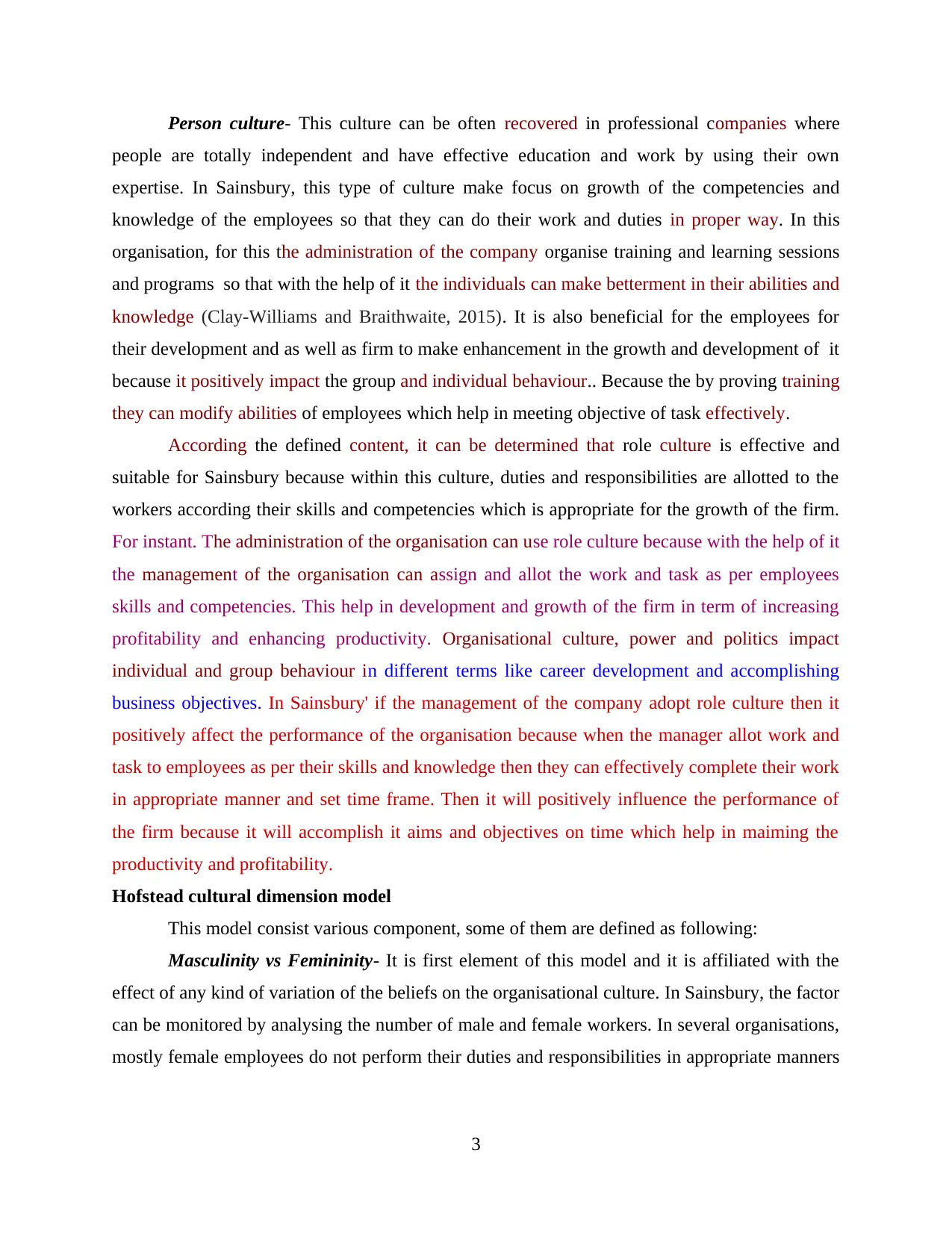
Person culture- This culture can be often recovered in professional companies where
people are totally independent and have effective education and work by using their own
expertise. In Sainsbury, this type of culture make focus on growth of the competencies and
knowledge of the employees so that they can do their work and duties in proper way. In this
organisation, for this the administration of the company organise training and learning sessions
and programs so that with the help of it the individuals can make betterment in their abilities and
knowledge (Clay-Williams and Braithwaite, 2015). It is also beneficial for the employees for
their development and as well as firm to make enhancement in the growth and development of it
because it positively impact the group and individual behaviour.. Because the by proving training
they can modify abilities of employees which help in meeting objective of task effectively.
According the defined content, it can be determined that role culture is effective and
suitable for Sainsbury because within this culture, duties and responsibilities are allotted to the
workers according their skills and competencies which is appropriate for the growth of the firm.
For instant. The administration of the organisation can use role culture because with the help of it
the management of the organisation can assign and allot the work and task as per employees
skills and competencies. This help in development and growth of the firm in term of increasing
profitability and enhancing productivity. Organisational culture, power and politics impact
individual and group behaviour in different terms like career development and accomplishing
business objectives. In Sainsbury' if the management of the company adopt role culture then it
positively affect the performance of the organisation because when the manager allot work and
task to employees as per their skills and knowledge then they can effectively complete their work
in appropriate manner and set time frame. Then it will positively influence the performance of
the firm because it will accomplish it aims and objectives on time which help in maiming the
productivity and profitability.
Hofstead cultural dimension model
This model consist various component, some of them are defined as following:
Masculinity vs Femininity- It is first element of this model and it is affiliated with the
effect of any kind of variation of the beliefs on the organisational culture. In Sainsbury, the factor
can be monitored by analysing the number of male and female workers. In several organisations,
mostly female employees do not perform their duties and responsibilities in appropriate manners
3
people are totally independent and have effective education and work by using their own
expertise. In Sainsbury, this type of culture make focus on growth of the competencies and
knowledge of the employees so that they can do their work and duties in proper way. In this
organisation, for this the administration of the company organise training and learning sessions
and programs so that with the help of it the individuals can make betterment in their abilities and
knowledge (Clay-Williams and Braithwaite, 2015). It is also beneficial for the employees for
their development and as well as firm to make enhancement in the growth and development of it
because it positively impact the group and individual behaviour.. Because the by proving training
they can modify abilities of employees which help in meeting objective of task effectively.
According the defined content, it can be determined that role culture is effective and
suitable for Sainsbury because within this culture, duties and responsibilities are allotted to the
workers according their skills and competencies which is appropriate for the growth of the firm.
For instant. The administration of the organisation can use role culture because with the help of it
the management of the organisation can assign and allot the work and task as per employees
skills and competencies. This help in development and growth of the firm in term of increasing
profitability and enhancing productivity. Organisational culture, power and politics impact
individual and group behaviour in different terms like career development and accomplishing
business objectives. In Sainsbury' if the management of the company adopt role culture then it
positively affect the performance of the organisation because when the manager allot work and
task to employees as per their skills and knowledge then they can effectively complete their work
in appropriate manner and set time frame. Then it will positively influence the performance of
the firm because it will accomplish it aims and objectives on time which help in maiming the
productivity and profitability.
Hofstead cultural dimension model
This model consist various component, some of them are defined as following:
Masculinity vs Femininity- It is first element of this model and it is affiliated with the
effect of any kind of variation of the beliefs on the organisational culture. In Sainsbury, the factor
can be monitored by analysing the number of male and female workers. In several organisations,
mostly female employees do not perform their duties and responsibilities in appropriate manners
3
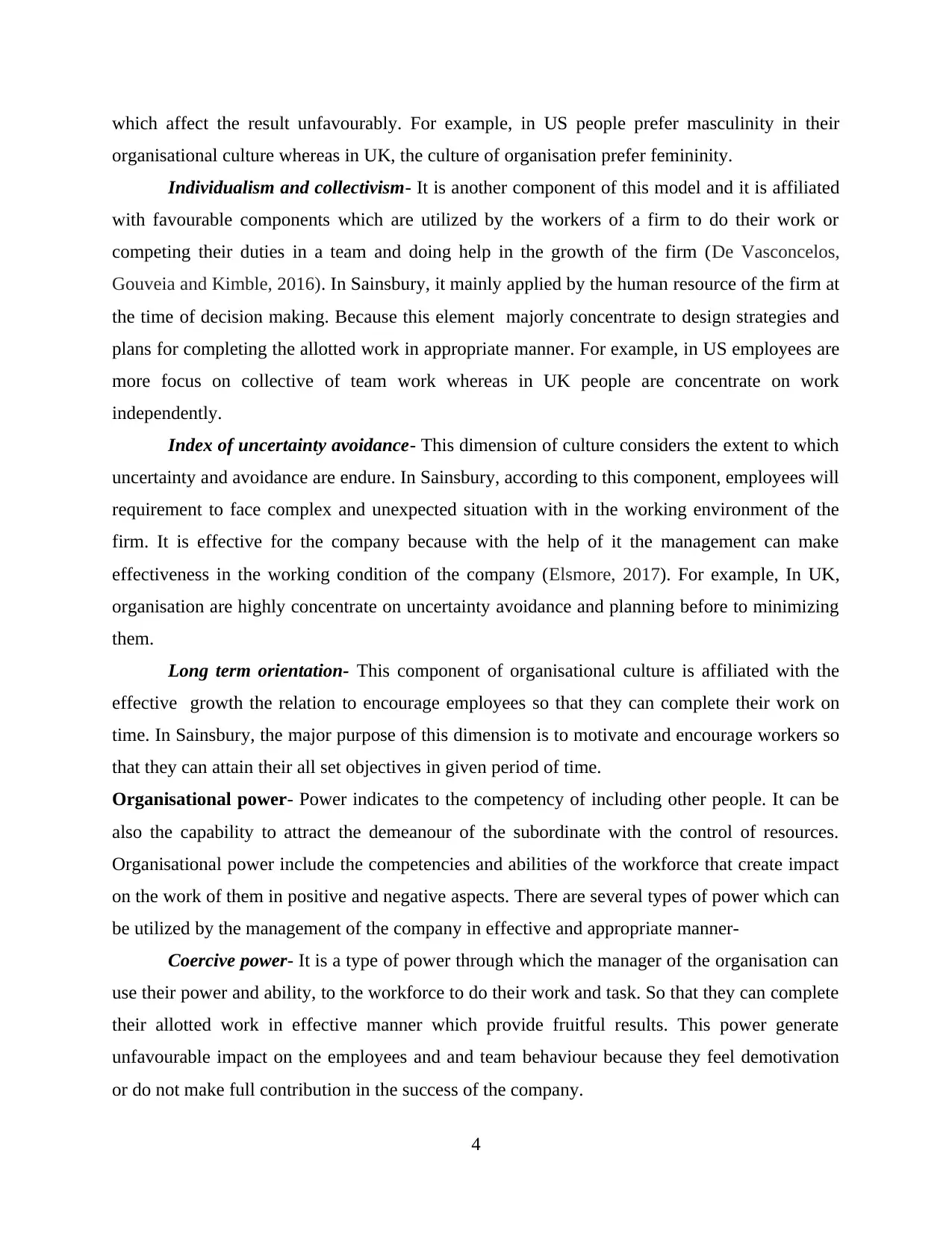
which affect the result unfavourably. For example, in US people prefer masculinity in their
organisational culture whereas in UK, the culture of organisation prefer femininity.
Individualism and collectivism- It is another component of this model and it is affiliated
with favourable components which are utilized by the workers of a firm to do their work or
competing their duties in a team and doing help in the growth of the firm (De Vasconcelos,
Gouveia and Kimble, 2016). In Sainsbury, it mainly applied by the human resource of the firm at
the time of decision making. Because this element majorly concentrate to design strategies and
plans for completing the allotted work in appropriate manner. For example, in US employees are
more focus on collective of team work whereas in UK people are concentrate on work
independently.
Index of uncertainty avoidance- This dimension of culture considers the extent to which
uncertainty and avoidance are endure. In Sainsbury, according to this component, employees will
requirement to face complex and unexpected situation with in the working environment of the
firm. It is effective for the company because with the help of it the management can make
effectiveness in the working condition of the company (Elsmore, 2017). For example, In UK,
organisation are highly concentrate on uncertainty avoidance and planning before to minimizing
them.
Long term orientation- This component of organisational culture is affiliated with the
effective growth the relation to encourage employees so that they can complete their work on
time. In Sainsbury, the major purpose of this dimension is to motivate and encourage workers so
that they can attain their all set objectives in given period of time.
Organisational power- Power indicates to the competency of including other people. It can be
also the capability to attract the demeanour of the subordinate with the control of resources.
Organisational power include the competencies and abilities of the workforce that create impact
on the work of them in positive and negative aspects. There are several types of power which can
be utilized by the management of the company in effective and appropriate manner-
Coercive power- It is a type of power through which the manager of the organisation can
use their power and ability, to the workforce to do their work and task. So that they can complete
their allotted work in effective manner which provide fruitful results. This power generate
unfavourable impact on the employees and and team behaviour because they feel demotivation
or do not make full contribution in the success of the company.
4
organisational culture whereas in UK, the culture of organisation prefer femininity.
Individualism and collectivism- It is another component of this model and it is affiliated
with favourable components which are utilized by the workers of a firm to do their work or
competing their duties in a team and doing help in the growth of the firm (De Vasconcelos,
Gouveia and Kimble, 2016). In Sainsbury, it mainly applied by the human resource of the firm at
the time of decision making. Because this element majorly concentrate to design strategies and
plans for completing the allotted work in appropriate manner. For example, in US employees are
more focus on collective of team work whereas in UK people are concentrate on work
independently.
Index of uncertainty avoidance- This dimension of culture considers the extent to which
uncertainty and avoidance are endure. In Sainsbury, according to this component, employees will
requirement to face complex and unexpected situation with in the working environment of the
firm. It is effective for the company because with the help of it the management can make
effectiveness in the working condition of the company (Elsmore, 2017). For example, In UK,
organisation are highly concentrate on uncertainty avoidance and planning before to minimizing
them.
Long term orientation- This component of organisational culture is affiliated with the
effective growth the relation to encourage employees so that they can complete their work on
time. In Sainsbury, the major purpose of this dimension is to motivate and encourage workers so
that they can attain their all set objectives in given period of time.
Organisational power- Power indicates to the competency of including other people. It can be
also the capability to attract the demeanour of the subordinate with the control of resources.
Organisational power include the competencies and abilities of the workforce that create impact
on the work of them in positive and negative aspects. There are several types of power which can
be utilized by the management of the company in effective and appropriate manner-
Coercive power- It is a type of power through which the manager of the organisation can
use their power and ability, to the workforce to do their work and task. So that they can complete
their allotted work in effective manner which provide fruitful results. This power generate
unfavourable impact on the employees and and team behaviour because they feel demotivation
or do not make full contribution in the success of the company.
4
⊘ This is a preview!⊘
Do you want full access?
Subscribe today to unlock all pages.

Trusted by 1+ million students worldwide
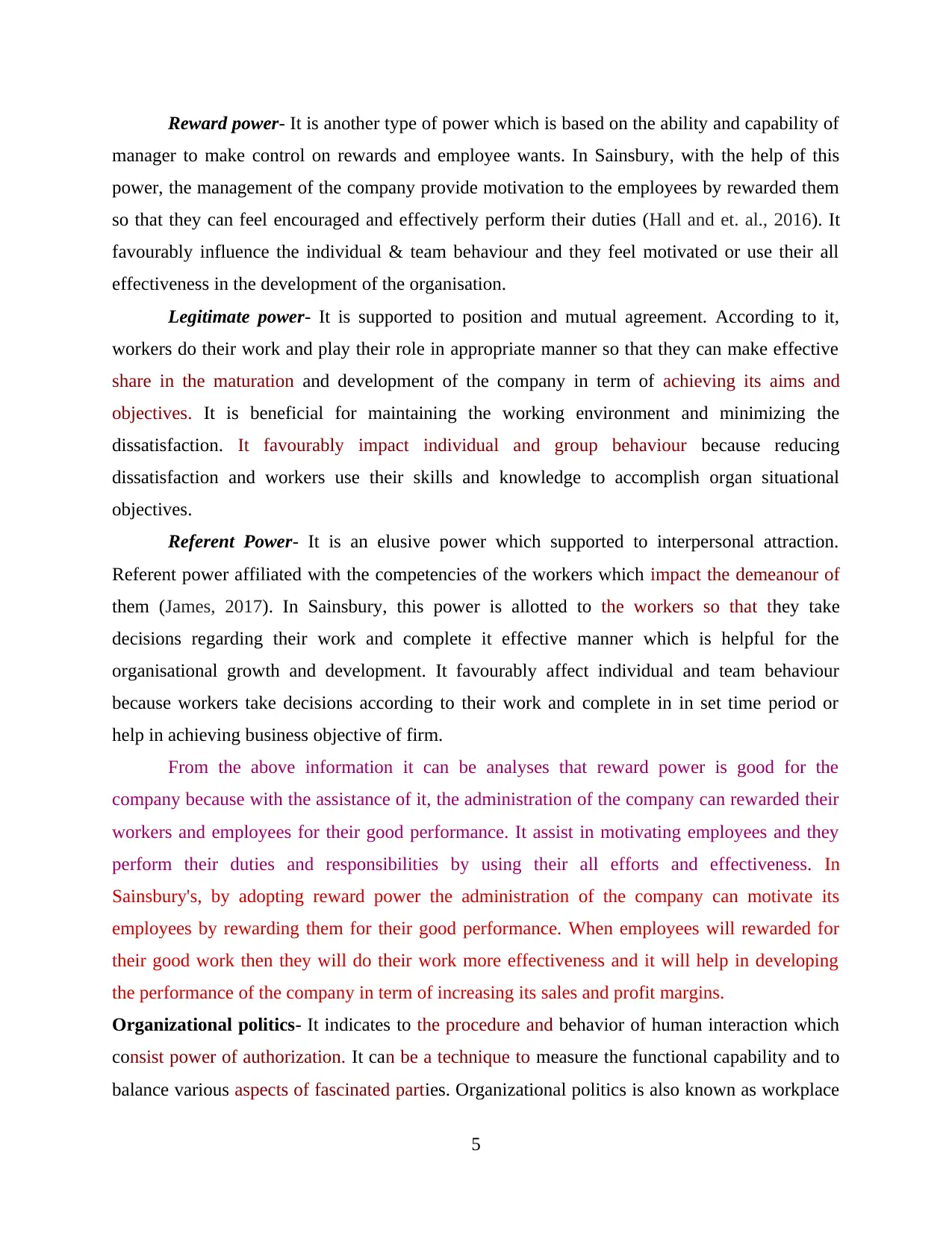
Reward power- It is another type of power which is based on the ability and capability of
manager to make control on rewards and employee wants. In Sainsbury, with the help of this
power, the management of the company provide motivation to the employees by rewarded them
so that they can feel encouraged and effectively perform their duties (Hall and et. al., 2016). It
favourably influence the individual & team behaviour and they feel motivated or use their all
effectiveness in the development of the organisation.
Legitimate power- It is supported to position and mutual agreement. According to it,
workers do their work and play their role in appropriate manner so that they can make effective
share in the maturation and development of the company in term of achieving its aims and
objectives. It is beneficial for maintaining the working environment and minimizing the
dissatisfaction. It favourably impact individual and group behaviour because reducing
dissatisfaction and workers use their skills and knowledge to accomplish organ situational
objectives.
Referent Power- It is an elusive power which supported to interpersonal attraction.
Referent power affiliated with the competencies of the workers which impact the demeanour of
them (James, 2017). In Sainsbury, this power is allotted to the workers so that they take
decisions regarding their work and complete it effective manner which is helpful for the
organisational growth and development. It favourably affect individual and team behaviour
because workers take decisions according to their work and complete in in set time period or
help in achieving business objective of firm.
From the above information it can be analyses that reward power is good for the
company because with the assistance of it, the administration of the company can rewarded their
workers and employees for their good performance. It assist in motivating employees and they
perform their duties and responsibilities by using their all efforts and effectiveness. In
Sainsbury's, by adopting reward power the administration of the company can motivate its
employees by rewarding them for their good performance. When employees will rewarded for
their good work then they will do their work more effectiveness and it will help in developing
the performance of the company in term of increasing its sales and profit margins.
Organizational politics- It indicates to the procedure and behavior of human interaction which
consist power of authorization. It can be a technique to measure the functional capability and to
balance various aspects of fascinated parties. Organizational politics is also known as workplace
5
manager to make control on rewards and employee wants. In Sainsbury, with the help of this
power, the management of the company provide motivation to the employees by rewarded them
so that they can feel encouraged and effectively perform their duties (Hall and et. al., 2016). It
favourably influence the individual & team behaviour and they feel motivated or use their all
effectiveness in the development of the organisation.
Legitimate power- It is supported to position and mutual agreement. According to it,
workers do their work and play their role in appropriate manner so that they can make effective
share in the maturation and development of the company in term of achieving its aims and
objectives. It is beneficial for maintaining the working environment and minimizing the
dissatisfaction. It favourably impact individual and group behaviour because reducing
dissatisfaction and workers use their skills and knowledge to accomplish organ situational
objectives.
Referent Power- It is an elusive power which supported to interpersonal attraction.
Referent power affiliated with the competencies of the workers which impact the demeanour of
them (James, 2017). In Sainsbury, this power is allotted to the workers so that they take
decisions regarding their work and complete it effective manner which is helpful for the
organisational growth and development. It favourably affect individual and team behaviour
because workers take decisions according to their work and complete in in set time period or
help in achieving business objective of firm.
From the above information it can be analyses that reward power is good for the
company because with the assistance of it, the administration of the company can rewarded their
workers and employees for their good performance. It assist in motivating employees and they
perform their duties and responsibilities by using their all efforts and effectiveness. In
Sainsbury's, by adopting reward power the administration of the company can motivate its
employees by rewarding them for their good performance. When employees will rewarded for
their good work then they will do their work more effectiveness and it will help in developing
the performance of the company in term of increasing its sales and profit margins.
Organizational politics- It indicates to the procedure and behavior of human interaction which
consist power of authorization. It can be a technique to measure the functional capability and to
balance various aspects of fascinated parties. Organizational politics is also known as workplace
5
Paraphrase This Document
Need a fresh take? Get an instant paraphrase of this document with our AI Paraphraser
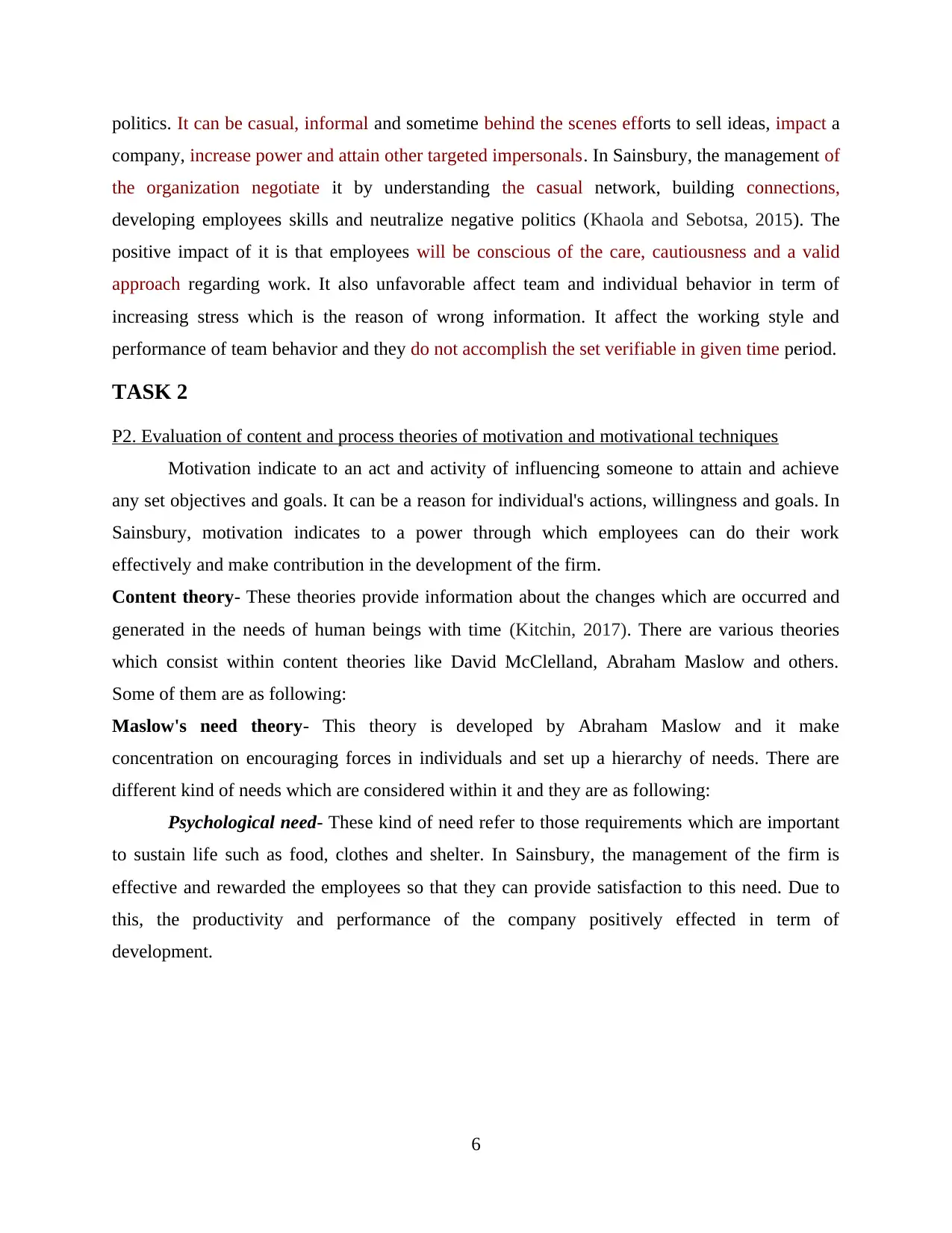
politics. It can be casual, informal and sometime behind the scenes efforts to sell ideas, impact a
company, increase power and attain other targeted impersonals. In Sainsbury, the management of
the organization negotiate it by understanding the casual network, building connections,
developing employees skills and neutralize negative politics (Khaola and Sebotsa, 2015). The
positive impact of it is that employees will be conscious of the care, cautiousness and a valid
approach regarding work. It also unfavorable affect team and individual behavior in term of
increasing stress which is the reason of wrong information. It affect the working style and
performance of team behavior and they do not accomplish the set verifiable in given time period.
TASK 2
P2. Evaluation of content and process theories of motivation and motivational techniques
Motivation indicate to an act and activity of influencing someone to attain and achieve
any set objectives and goals. It can be a reason for individual's actions, willingness and goals. In
Sainsbury, motivation indicates to a power through which employees can do their work
effectively and make contribution in the development of the firm.
Content theory- These theories provide information about the changes which are occurred and
generated in the needs of human beings with time (Kitchin, 2017). There are various theories
which consist within content theories like David McClelland, Abraham Maslow and others.
Some of them are as following:
Maslow's need theory- This theory is developed by Abraham Maslow and it make
concentration on encouraging forces in individuals and set up a hierarchy of needs. There are
different kind of needs which are considered within it and they are as following:
Psychological need- These kind of need refer to those requirements which are important
to sustain life such as food, clothes and shelter. In Sainsbury, the management of the firm is
effective and rewarded the employees so that they can provide satisfaction to this need. Due to
this, the productivity and performance of the company positively effected in term of
development.
6
company, increase power and attain other targeted impersonals. In Sainsbury, the management of
the organization negotiate it by understanding the casual network, building connections,
developing employees skills and neutralize negative politics (Khaola and Sebotsa, 2015). The
positive impact of it is that employees will be conscious of the care, cautiousness and a valid
approach regarding work. It also unfavorable affect team and individual behavior in term of
increasing stress which is the reason of wrong information. It affect the working style and
performance of team behavior and they do not accomplish the set verifiable in given time period.
TASK 2
P2. Evaluation of content and process theories of motivation and motivational techniques
Motivation indicate to an act and activity of influencing someone to attain and achieve
any set objectives and goals. It can be a reason for individual's actions, willingness and goals. In
Sainsbury, motivation indicates to a power through which employees can do their work
effectively and make contribution in the development of the firm.
Content theory- These theories provide information about the changes which are occurred and
generated in the needs of human beings with time (Kitchin, 2017). There are various theories
which consist within content theories like David McClelland, Abraham Maslow and others.
Some of them are as following:
Maslow's need theory- This theory is developed by Abraham Maslow and it make
concentration on encouraging forces in individuals and set up a hierarchy of needs. There are
different kind of needs which are considered within it and they are as following:
Psychological need- These kind of need refer to those requirements which are important
to sustain life such as food, clothes and shelter. In Sainsbury, the management of the firm is
effective and rewarded the employees so that they can provide satisfaction to this need. Due to
this, the productivity and performance of the company positively effected in term of
development.
6
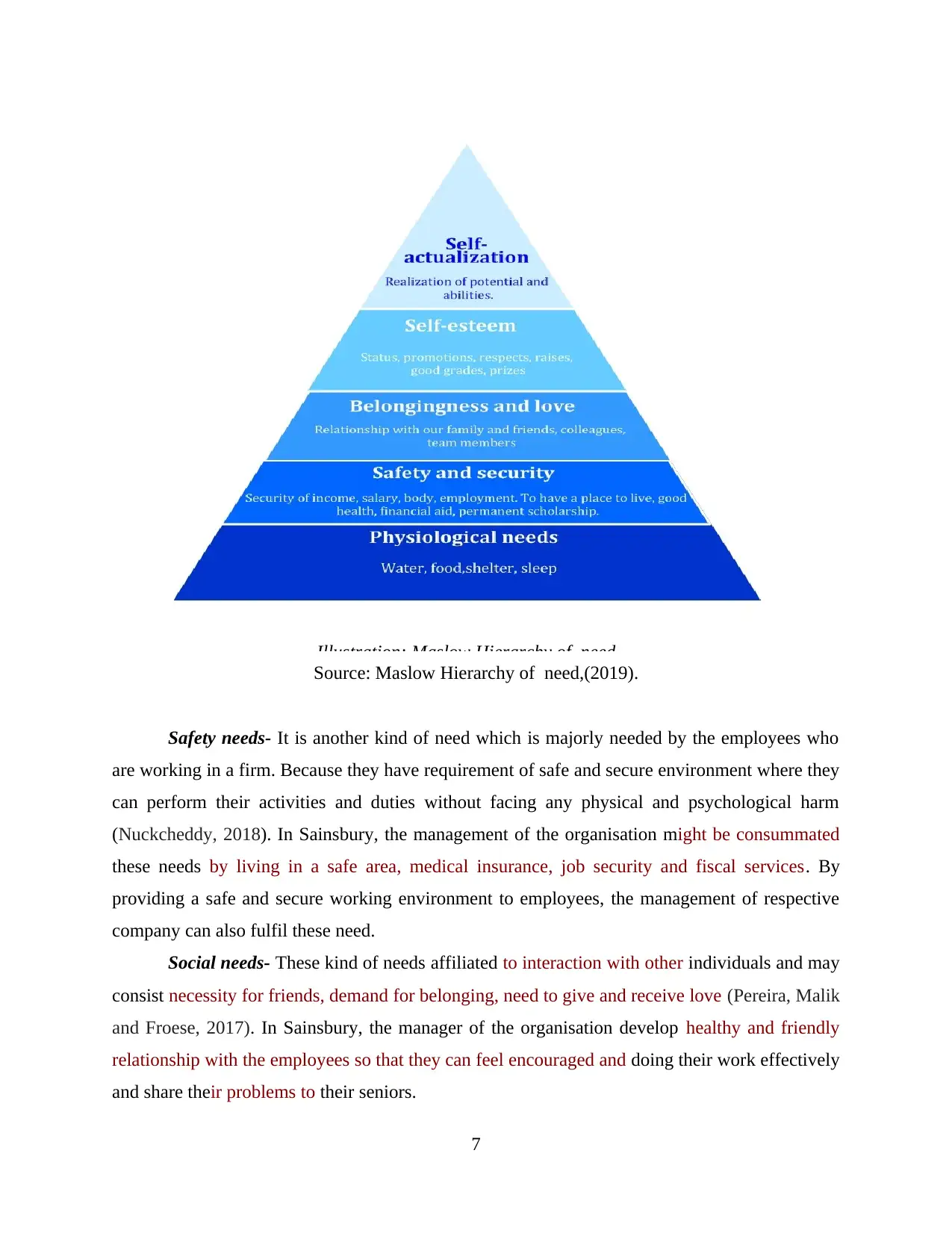
Source: Maslow Hierarchy of need,(2019).
Safety needs- It is another kind of need which is majorly needed by the employees who
are working in a firm. Because they have requirement of safe and secure environment where they
can perform their activities and duties without facing any physical and psychological harm
(Nuckcheddy, 2018). In Sainsbury, the management of the organisation might be consummated
these needs by living in a safe area, medical insurance, job security and fiscal services. By
providing a safe and secure working environment to employees, the management of respective
company can also fulfil these need.
Social needs- These kind of needs affiliated to interaction with other individuals and may
consist necessity for friends, demand for belonging, need to give and receive love (Pereira, Malik
and Froese, 2017). In Sainsbury, the manager of the organisation develop healthy and friendly
relationship with the employees so that they can feel encouraged and doing their work effectively
and share their problems to their seniors.
7
Illustration: Maslow Hierarchy of need
Safety needs- It is another kind of need which is majorly needed by the employees who
are working in a firm. Because they have requirement of safe and secure environment where they
can perform their activities and duties without facing any physical and psychological harm
(Nuckcheddy, 2018). In Sainsbury, the management of the organisation might be consummated
these needs by living in a safe area, medical insurance, job security and fiscal services. By
providing a safe and secure working environment to employees, the management of respective
company can also fulfil these need.
Social needs- These kind of needs affiliated to interaction with other individuals and may
consist necessity for friends, demand for belonging, need to give and receive love (Pereira, Malik
and Froese, 2017). In Sainsbury, the manager of the organisation develop healthy and friendly
relationship with the employees so that they can feel encouraged and doing their work effectively
and share their problems to their seniors.
7
Illustration: Maslow Hierarchy of need
⊘ This is a preview!⊘
Do you want full access?
Subscribe today to unlock all pages.

Trusted by 1+ million students worldwide
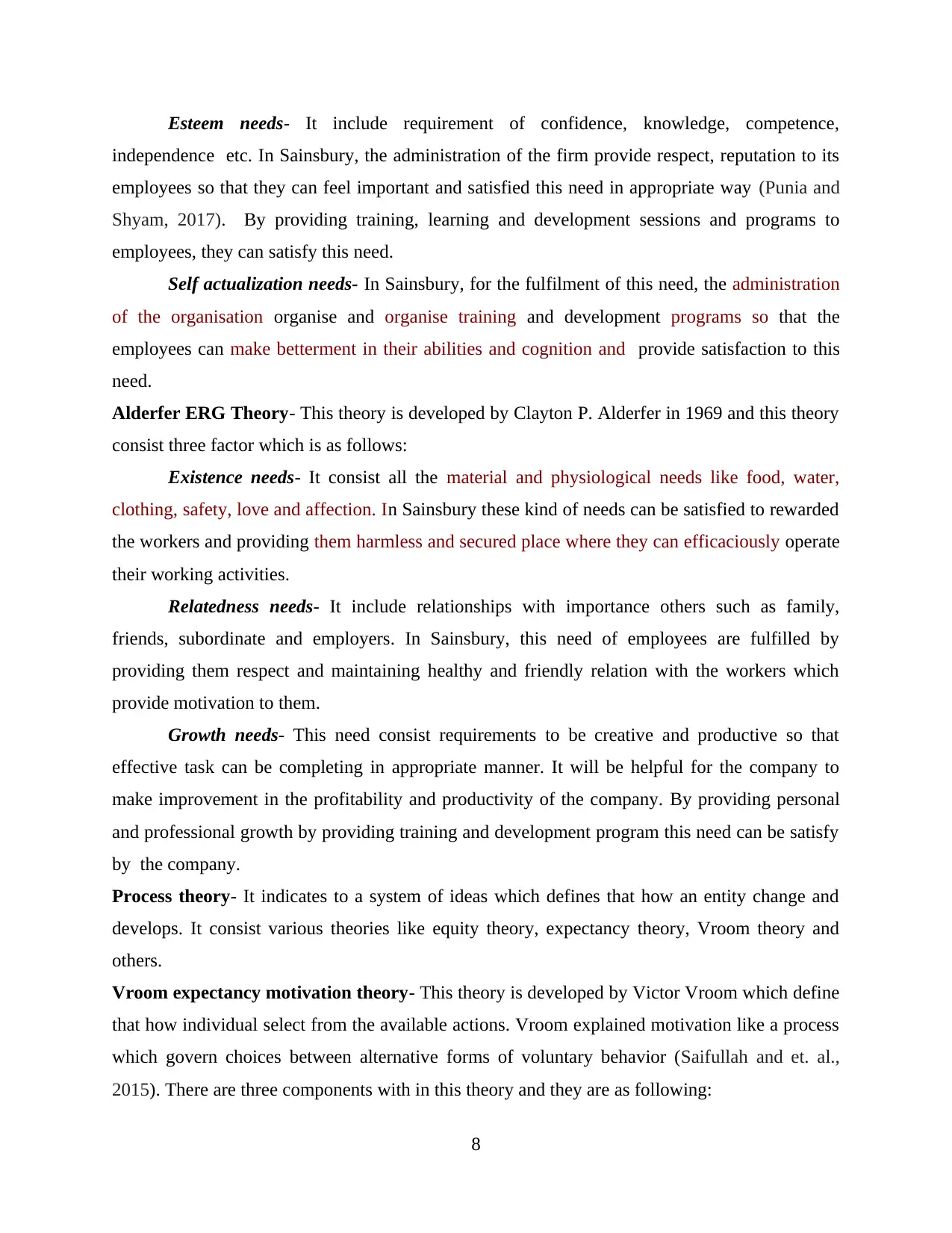
Esteem needs- It include requirement of confidence, knowledge, competence,
independence etc. In Sainsbury, the administration of the firm provide respect, reputation to its
employees so that they can feel important and satisfied this need in appropriate way (Punia and
Shyam, 2017). By providing training, learning and development sessions and programs to
employees, they can satisfy this need.
Self actualization needs- In Sainsbury, for the fulfilment of this need, the administration
of the organisation organise and organise training and development programs so that the
employees can make betterment in their abilities and cognition and provide satisfaction to this
need.
Alderfer ERG Theory- This theory is developed by Clayton P. Alderfer in 1969 and this theory
consist three factor which is as follows:
Existence needs- It consist all the material and physiological needs like food, water,
clothing, safety, love and affection. In Sainsbury these kind of needs can be satisfied to rewarded
the workers and providing them harmless and secured place where they can efficaciously operate
their working activities.
Relatedness needs- It include relationships with importance others such as family,
friends, subordinate and employers. In Sainsbury, this need of employees are fulfilled by
providing them respect and maintaining healthy and friendly relation with the workers which
provide motivation to them.
Growth needs- This need consist requirements to be creative and productive so that
effective task can be completing in appropriate manner. It will be helpful for the company to
make improvement in the profitability and productivity of the company. By providing personal
and professional growth by providing training and development program this need can be satisfy
by the company.
Process theory- It indicates to a system of ideas which defines that how an entity change and
develops. It consist various theories like equity theory, expectancy theory, Vroom theory and
others.
Vroom expectancy motivation theory- This theory is developed by Victor Vroom which define
that how individual select from the available actions. Vroom explained motivation like a process
which govern choices between alternative forms of voluntary behavior (Saifullah and et. al.,
2015). There are three components with in this theory and they are as following:
8
independence etc. In Sainsbury, the administration of the firm provide respect, reputation to its
employees so that they can feel important and satisfied this need in appropriate way (Punia and
Shyam, 2017). By providing training, learning and development sessions and programs to
employees, they can satisfy this need.
Self actualization needs- In Sainsbury, for the fulfilment of this need, the administration
of the organisation organise and organise training and development programs so that the
employees can make betterment in their abilities and cognition and provide satisfaction to this
need.
Alderfer ERG Theory- This theory is developed by Clayton P. Alderfer in 1969 and this theory
consist three factor which is as follows:
Existence needs- It consist all the material and physiological needs like food, water,
clothing, safety, love and affection. In Sainsbury these kind of needs can be satisfied to rewarded
the workers and providing them harmless and secured place where they can efficaciously operate
their working activities.
Relatedness needs- It include relationships with importance others such as family,
friends, subordinate and employers. In Sainsbury, this need of employees are fulfilled by
providing them respect and maintaining healthy and friendly relation with the workers which
provide motivation to them.
Growth needs- This need consist requirements to be creative and productive so that
effective task can be completing in appropriate manner. It will be helpful for the company to
make improvement in the profitability and productivity of the company. By providing personal
and professional growth by providing training and development program this need can be satisfy
by the company.
Process theory- It indicates to a system of ideas which defines that how an entity change and
develops. It consist various theories like equity theory, expectancy theory, Vroom theory and
others.
Vroom expectancy motivation theory- This theory is developed by Victor Vroom which define
that how individual select from the available actions. Vroom explained motivation like a process
which govern choices between alternative forms of voluntary behavior (Saifullah and et. al.,
2015). There are three components with in this theory and they are as following:
8
Paraphrase This Document
Need a fresh take? Get an instant paraphrase of this document with our AI Paraphraser
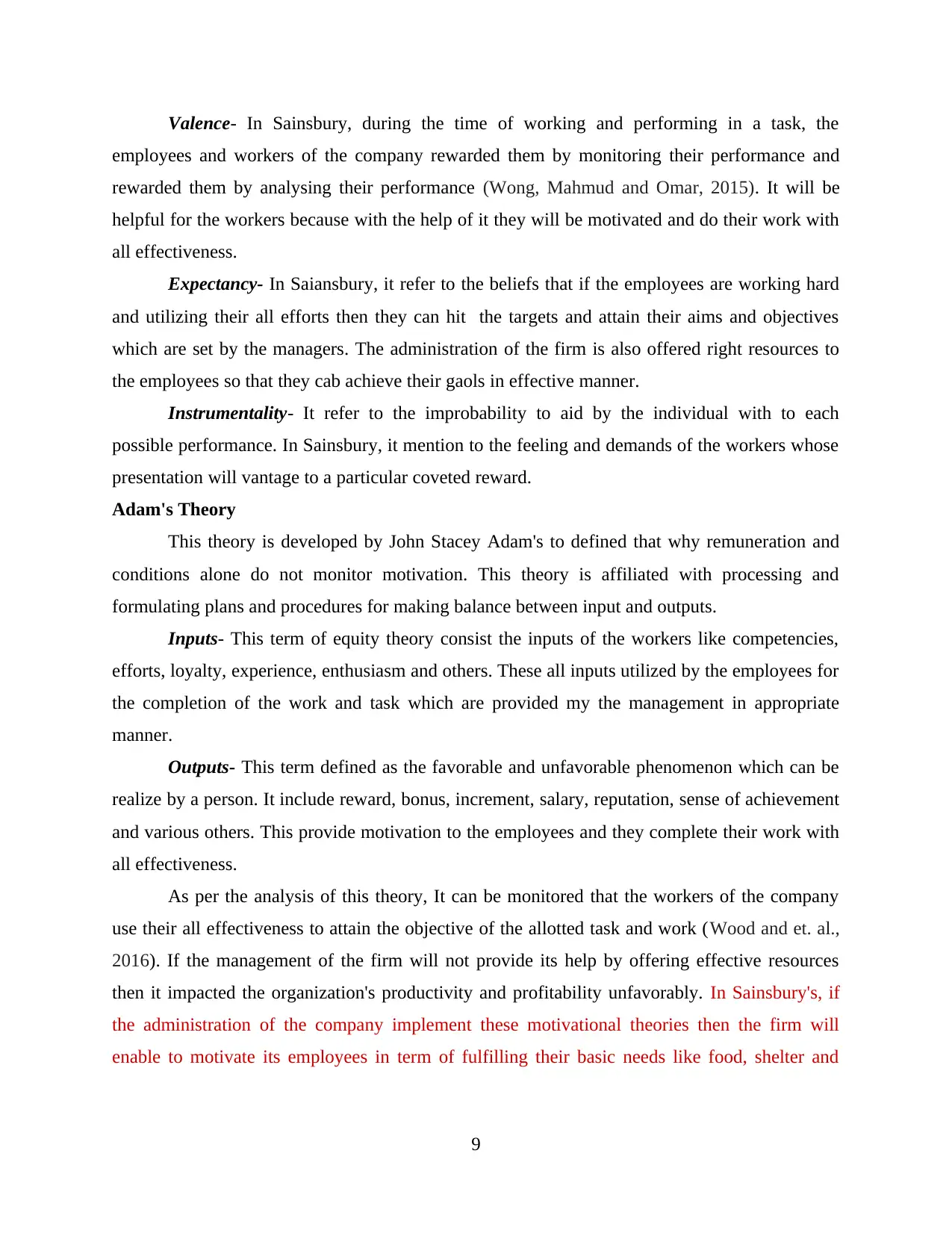
Valence- In Sainsbury, during the time of working and performing in a task, the
employees and workers of the company rewarded them by monitoring their performance and
rewarded them by analysing their performance (Wong, Mahmud and Omar, 2015). It will be
helpful for the workers because with the help of it they will be motivated and do their work with
all effectiveness.
Expectancy- In Saiansbury, it refer to the beliefs that if the employees are working hard
and utilizing their all efforts then they can hit the targets and attain their aims and objectives
which are set by the managers. The administration of the firm is also offered right resources to
the employees so that they cab achieve their gaols in effective manner.
Instrumentality- It refer to the improbability to aid by the individual with to each
possible performance. In Sainsbury, it mention to the feeling and demands of the workers whose
presentation will vantage to a particular coveted reward.
Adam's Theory
This theory is developed by John Stacey Adam's to defined that why remuneration and
conditions alone do not monitor motivation. This theory is affiliated with processing and
formulating plans and procedures for making balance between input and outputs.
Inputs- This term of equity theory consist the inputs of the workers like competencies,
efforts, loyalty, experience, enthusiasm and others. These all inputs utilized by the employees for
the completion of the work and task which are provided my the management in appropriate
manner.
Outputs- This term defined as the favorable and unfavorable phenomenon which can be
realize by a person. It include reward, bonus, increment, salary, reputation, sense of achievement
and various others. This provide motivation to the employees and they complete their work with
all effectiveness.
As per the analysis of this theory, It can be monitored that the workers of the company
use their all effectiveness to attain the objective of the allotted task and work (Wood and et. al.,
2016). If the management of the firm will not provide its help by offering effective resources
then it impacted the organization's productivity and profitability unfavorably. In Sainsbury's, if
the administration of the company implement these motivational theories then the firm will
enable to motivate its employees in term of fulfilling their basic needs like food, shelter and
9
employees and workers of the company rewarded them by monitoring their performance and
rewarded them by analysing their performance (Wong, Mahmud and Omar, 2015). It will be
helpful for the workers because with the help of it they will be motivated and do their work with
all effectiveness.
Expectancy- In Saiansbury, it refer to the beliefs that if the employees are working hard
and utilizing their all efforts then they can hit the targets and attain their aims and objectives
which are set by the managers. The administration of the firm is also offered right resources to
the employees so that they cab achieve their gaols in effective manner.
Instrumentality- It refer to the improbability to aid by the individual with to each
possible performance. In Sainsbury, it mention to the feeling and demands of the workers whose
presentation will vantage to a particular coveted reward.
Adam's Theory
This theory is developed by John Stacey Adam's to defined that why remuneration and
conditions alone do not monitor motivation. This theory is affiliated with processing and
formulating plans and procedures for making balance between input and outputs.
Inputs- This term of equity theory consist the inputs of the workers like competencies,
efforts, loyalty, experience, enthusiasm and others. These all inputs utilized by the employees for
the completion of the work and task which are provided my the management in appropriate
manner.
Outputs- This term defined as the favorable and unfavorable phenomenon which can be
realize by a person. It include reward, bonus, increment, salary, reputation, sense of achievement
and various others. This provide motivation to the employees and they complete their work with
all effectiveness.
As per the analysis of this theory, It can be monitored that the workers of the company
use their all effectiveness to attain the objective of the allotted task and work (Wood and et. al.,
2016). If the management of the firm will not provide its help by offering effective resources
then it impacted the organization's productivity and profitability unfavorably. In Sainsbury's, if
the administration of the company implement these motivational theories then the firm will
enable to motivate its employees in term of fulfilling their basic needs like food, shelter and
9
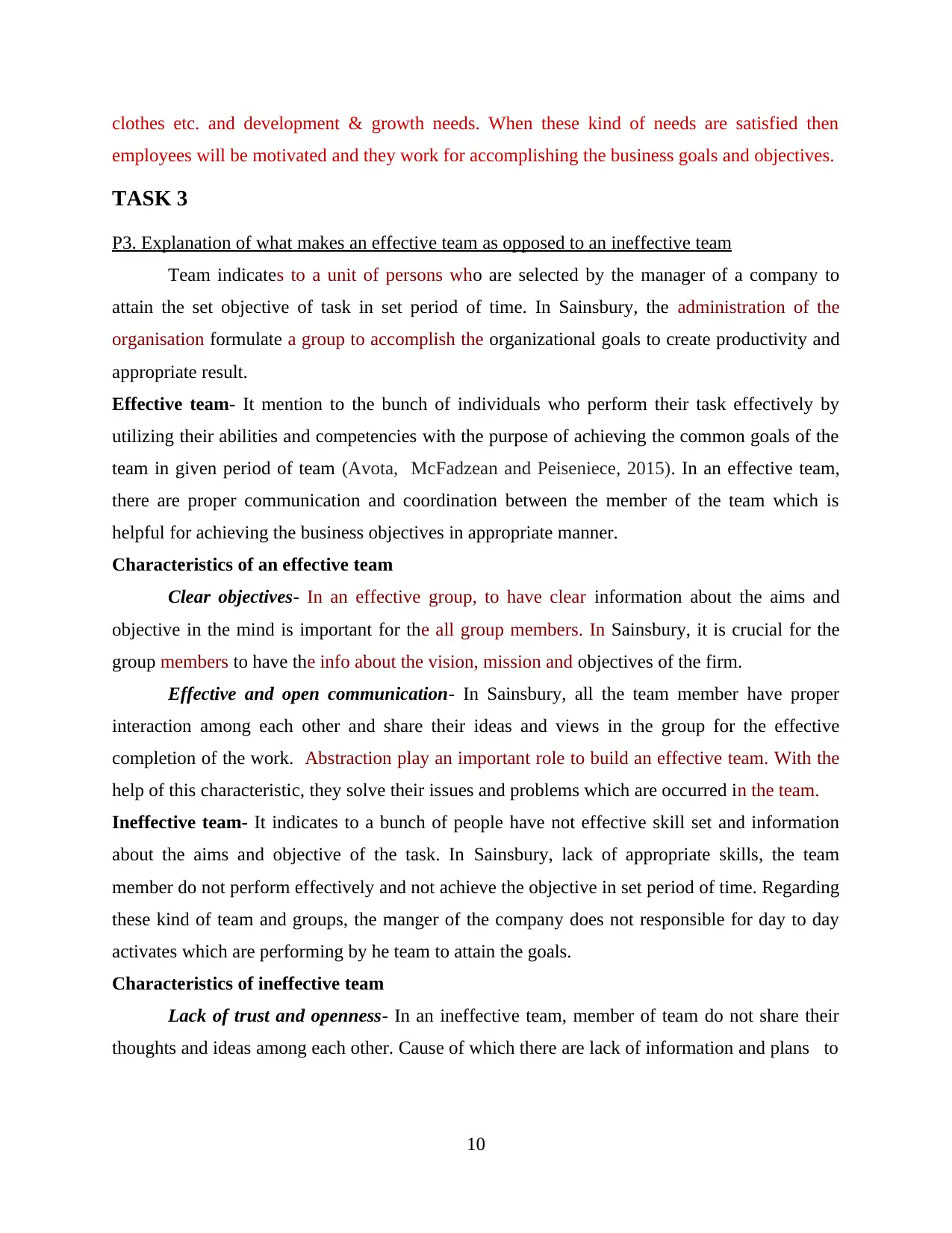
clothes etc. and development & growth needs. When these kind of needs are satisfied then
employees will be motivated and they work for accomplishing the business goals and objectives.
TASK 3
P3. Explanation of what makes an effective team as opposed to an ineffective team
Team indicates to a unit of persons who are selected by the manager of a company to
attain the set objective of task in set period of time. In Sainsbury, the administration of the
organisation formulate a group to accomplish the organizational goals to create productivity and
appropriate result.
Effective team- It mention to the bunch of individuals who perform their task effectively by
utilizing their abilities and competencies with the purpose of achieving the common goals of the
team in given period of team (Avota, McFadzean and Peiseniece, 2015). In an effective team,
there are proper communication and coordination between the member of the team which is
helpful for achieving the business objectives in appropriate manner.
Characteristics of an effective team
Clear objectives- In an effective group, to have clear information about the aims and
objective in the mind is important for the all group members. In Sainsbury, it is crucial for the
group members to have the info about the vision, mission and objectives of the firm.
Effective and open communication- In Sainsbury, all the team member have proper
interaction among each other and share their ideas and views in the group for the effective
completion of the work. Abstraction play an important role to build an effective team. With the
help of this characteristic, they solve their issues and problems which are occurred in the team.
Ineffective team- It indicates to a bunch of people have not effective skill set and information
about the aims and objective of the task. In Sainsbury, lack of appropriate skills, the team
member do not perform effectively and not achieve the objective in set period of time. Regarding
these kind of team and groups, the manger of the company does not responsible for day to day
activates which are performing by he team to attain the goals.
Characteristics of ineffective team
Lack of trust and openness- In an ineffective team, member of team do not share their
thoughts and ideas among each other. Cause of which there are lack of information and plans to
10
employees will be motivated and they work for accomplishing the business goals and objectives.
TASK 3
P3. Explanation of what makes an effective team as opposed to an ineffective team
Team indicates to a unit of persons who are selected by the manager of a company to
attain the set objective of task in set period of time. In Sainsbury, the administration of the
organisation formulate a group to accomplish the organizational goals to create productivity and
appropriate result.
Effective team- It mention to the bunch of individuals who perform their task effectively by
utilizing their abilities and competencies with the purpose of achieving the common goals of the
team in given period of team (Avota, McFadzean and Peiseniece, 2015). In an effective team,
there are proper communication and coordination between the member of the team which is
helpful for achieving the business objectives in appropriate manner.
Characteristics of an effective team
Clear objectives- In an effective group, to have clear information about the aims and
objective in the mind is important for the all group members. In Sainsbury, it is crucial for the
group members to have the info about the vision, mission and objectives of the firm.
Effective and open communication- In Sainsbury, all the team member have proper
interaction among each other and share their ideas and views in the group for the effective
completion of the work. Abstraction play an important role to build an effective team. With the
help of this characteristic, they solve their issues and problems which are occurred in the team.
Ineffective team- It indicates to a bunch of people have not effective skill set and information
about the aims and objective of the task. In Sainsbury, lack of appropriate skills, the team
member do not perform effectively and not achieve the objective in set period of time. Regarding
these kind of team and groups, the manger of the company does not responsible for day to day
activates which are performing by he team to attain the goals.
Characteristics of ineffective team
Lack of trust and openness- In an ineffective team, member of team do not share their
thoughts and ideas among each other. Cause of which there are lack of information and plans to
10
⊘ This is a preview!⊘
Do you want full access?
Subscribe today to unlock all pages.

Trusted by 1+ million students worldwide
1 out of 20
Related Documents
Your All-in-One AI-Powered Toolkit for Academic Success.
+13062052269
info@desklib.com
Available 24*7 on WhatsApp / Email
![[object Object]](/_next/static/media/star-bottom.7253800d.svg)
Unlock your academic potential
Copyright © 2020–2026 A2Z Services. All Rights Reserved. Developed and managed by ZUCOL.





